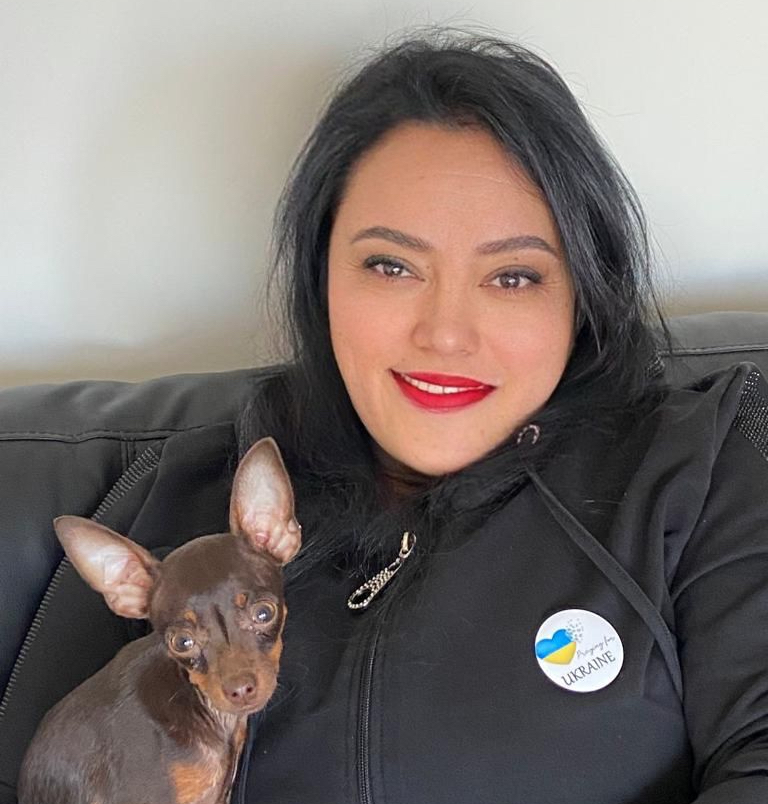A 35-hour curfew had been imposed on Elena Kramerova’s hometown of Kyiv. A residential building 10 minutes away from the 55-year-old’s home had just been bombed.
But thanks to the quick thinking of her sister Laura Kramer Rahmil in Los Gatos—and her own steely resolve evident when she carried her 5-month-old dog Chanel across the Polish border in a knapsack—she was already in Tijuana, Mexico.
However, as previously reported in the Los Gatan, she’d been stuck there for days, trying to find a way to get to California, where her son lives.
Refugees haven’t been allowed to enter the United States due to a pandemic-era policy called Title 42.
More than 300 Ukrainians have made it to Tijuana after flying to Mexico, a representative for the Baja California state told Al Jazeera.
On March 16, Kramer Rahmil spoke with her sister, who was hopeful about her chances of making it across into the U.S.
“She was very positive,” Kramer Rahmil recalls. “She said, ‘I’ll see you soon.’”
But it wasn’t for sure that things would go in their favor.
For days Kramer Rahmil had been writing letters to Congressional officials trying to get help for the nearly-blind woman fleeing the Russian invasion of her country.
She’d tried Democratic senators Dianne Feinstein and Alex Padilla, and Republican senator Marco Rubio, but didn’t hear back.
So on March 15 she wrote to Anna Eshoo, who represents Los Gatos in Washington, mentioning she’d previously sought her help with another immigration matter.
Kramer Rahmil explained she was seeking a letter of support for her sister, and reminded staffer Anne Ream of their prior contact.
“She remembered me,” Kramer Rahmil said, sharing her gratitude for Ream’s quick action. “And within an hour she had a letter for me.”
‘Part of the problem when you flee your country because of war is. you don’t necessarily qualify for asylum status’
—Nanya Thompson, immigration attorney
On Thursday, in the wee hours of the morning, Kramer Rahmil’s nephew, Arthur Marievsky, went and got his mom from the Tijuana apartment they’d rented. They headed to their 6:30am appointment at the United States border—armed with the letter.
They didn’t know if it would just be for a pre-interview, or if this was the real-deal. But, they’d handed the keys back to the apartment anyway, just in case.
“I knew that it should be a positive result, because this is how I am,” Kramer Rahmil said. “Never say never.”
Their San Diego-based immigration lawyer, Nanya Thompson, wasn’t so sure.
“Part of the problem when you flee your country because of war is you don’t necessarily qualify for asylum status,” she said, adding there was extra urgency due to Kramerova’s health. “In Laura’s sister’s case there were medical issues that they were worried about.”
In the end, a border official fingerprinted Kramerova and she was granted “humanitarian parole” entry, a type of emergency permission.
A Reuters report, citing a former US Customs and Border Protection official, confirmed Ukrainians are now being offered this status.
But, as an Al Jazeera news piece noted, people from non-Ukrainian countries—such as Russians who don’t support the war—were being turned away at the Tijuana crossing.
Border officials generally find Central American migrants fall under Title 42, Thompson said.
“The reason why the Biden Administration can justify the different treatment is because the situation in Ukraine is unprecedented,” she said. “There’s a sense of urgency, particularly for people who are vulnerable in Mexico.”
Recent statements from Secretary of Homeland Security Alejandro Mayorkas about how the US government views Ukrainian refugees that seem to have made the biggest difference to border officials, Thompson says, but adds the letter from Eshoo’s office likely helped Kramerova secure entry.

Safe at Last, Others in Peril
Before they knew it, Kramerova and her dog Chanel were at her son’s home in San Diego.
She’d upgraded to a proper dog carrier in Poland. But now, the pup was free to frolic in Marievsky’s yard.
“She said she’s very happy,” Kramer Rahmil reported that day. “She bought her fish and meat.”
Kramerova was even able to make good use of her time in Tijuana, getting a filling that came out fixed for much cheaper than what it would cost in California.
Now, Kramer Rahmil has turned her attention to several other Ukrainians fleeing Russian aggression.
She connected one of her daughter-in-law’s cousins—18-year-old student Anna Melnikova, and her mom Yulia, who fled Odessa—with a friend living in Bulgaria.
“Bulgaria is one of my favorite little countries in the world,” she said. “It’s beautiful. People are wonderful. It has mountains for skiing. It has Black Sea.”
Another of the daughter-in-law’s cousins, also from Odessa, made it to Bulgaria too, and has been put up for free in a resort area, for now.
Kramer Rahmil sent $500 to her friend to assist the extended family members. But she’d like for them to be able to come to the US temporarily, since they don’t have a connection to Bulgaria and do have relatives in America.
On Tuesday night, the 66-year-old father of Kramer Rahmil’s son-in-law, who lives in Kyiv, hadn’t been heard from for a couple weeks.
And the 63-year-old father of her daughter-in-law, who normally lives in Odessa, had made it to a town near the Romanian border.
“He did not cross it yet,” she said. “We do not know why.”
Kramerova has been resting up, after the strenuous journey, and Kramer Rahmil says she can’t wait for her sister to check out Los Gatos.
“She’ll visit, once she’ll recover,” she said, adding while her sister may be in California now, she’s still consumed by news from overseas. “I said, ‘Don’t think of it. Just try to recover. You’re in a safe place.’”
Featured photo – Elena Kramerova in San Diego, safe at last. (contributed)










